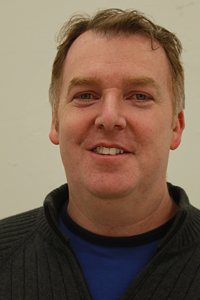 Bruce Thompson. |
Being a mature student gives him advantages in his work as a graduate assistant in visual arts, says MFA student Bruce Thompson.
 Bruce Thompson. |
Being a mature student gives him advantages in his work as a graduate assistant in visual arts, says MFA student Bruce Thompson.
After releasing a debut EP, producing its first music video and playing several opening gigs for bigger Canadian acts, Windsor-based alternative rock band Pulp City Inn has had its busiest year yet.
Band members—lead singer Justin Zuccato, guitar player Darryl Festa, bass player Brandon Zuccato and drummer Brandon Lefrancois—have been struggling to juggle their academic and musical careers.
The argumentative theory of reasoning challenges the traditional view that the function of reasoning is to help us get better beliefs and improve our decision-making, says philosophy professor Christopher Tindale.
“Instead, the theory presents reasoning as a purely social phenomenon that has developed in order to help us convince others and monitor the ways other people try to convince us,” he says. “One interesting consequence is that apparent flawed reasoning is itself a useful adaptation that aids in persuasion.”
People who are 50 years or older and who don’t have positive thoughts about aging may want to participate in a free workshop and research study that’s aimed at reducing negative thinking about getting older.
Have you ever remembered something that happened to you, only to find out it didn’t really happen to you? And even though you realize it didn’t happen to you, can you still ‘remember’ specific details about the event?
People who are 50 years or older and who don’t have positive thoughts about aging may want to participate in a free workshop and research study that’s aimed at reducing negative thinking about getting older.
When a child is diagnosed with a behavioural problem or a learning disability, it’s often because a teacher has spotted the signs of it first.
 Carlin Miller. |
The African Diaspora Youth Conference changed Shauntae Robinson-Weekes’ life, giving her the courage to pursue post-secondary education. She attended in 2008 as a grade 11 student Toronto’s Oakwood Collegiate Institute.
“I had never been on a university campus before,” says Robinson-Weekes, just finished her second year of studies in French and psychology at the University of Windsor. She says she had been afraid she couldn’t afford university until she saw the example of so many of the event’s organizers and speakers.
A new program to conduct psycho-educational assessments of local children and adolescents will provide “a gold-standard service,” says the faculty member heading up the project.
“We can take more time with cases,” says Sylvia Voelker, director of the Psychological Services and Research Centre. “We plan to conduct follow-up to see how the recommendations from the assessments are acted on.”
The fastest two minutes in sports couldn’t have gone any slower for UWindsor grad Paul Reddam (BA psychology 1976, honours 1977).
“I was just kind of numb through the whole race, and opened my eyes when it was over,” he said after his horse I’ll Have Another captured the 138th running of the Kentucky Derby and the $1 million winner’s share of the $2 million purse Saturday, May 5, at Churchill Downs in Lexington.